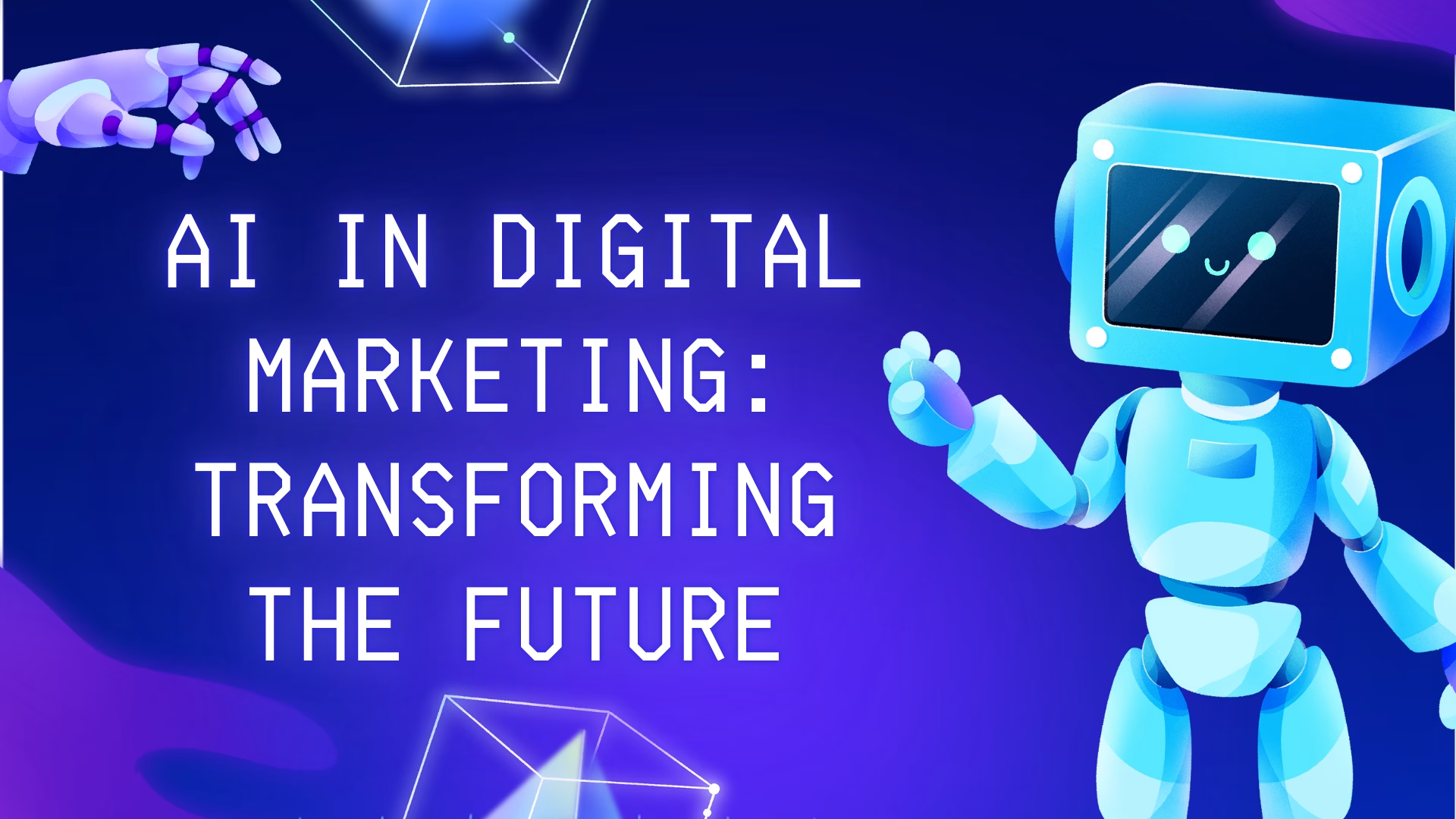AI in Digital Marketing: Transforming the Future

AI in Digital Marketing: Transforming the Future
In today’s fast-paced digital world, artificial intelligence (AI) is no longer just a futuristic concept; it is a driving force behind the transformation of various industries, including digital marketing. The integration of AI in digital marketing has opened up new possibilities, allowing businesses to optimize their strategies, enhance customer experiences, and achieve measurable results.
What is AI in Digital Marketing?
Artificial intelligence refers to the simulation of human intelligence in machines that are programmed to think, learn, and make decisions. In digital marketing, AI helps businesses analyze vast amounts of data, predict consumer behavior, and automate repetitive tasks. AI-powered tools are becoming indispensable for marketers aiming to stay ahead in a highly competitive environment.
Key Applications of AI in Digital Marketing
1. Personalized Customer Experiences
Personalization is a cornerstone of successful digital marketing, and AI takes it to the next level. With AI algorithms, businesses can analyze user data, such as browsing history, preferences, and purchase patterns, to deliver highly tailored content and recommendations. Platforms like Amazon and Netflix use AI to provide personalized product and content suggestions, boosting customer satisfaction and engagement.
2. Chatbots and Conversational AI
AI-driven chatbots are revolutionizing customer service by providing instant responses and support 24/7. These intelligent bots can handle inquiries, resolve issues, and guide customers through the sales process. With natural language processing (NLP) capabilities, chatbots can understand and respond in a human-like manner, creating seamless interactions that improve user experiences.
3. Predictive Analytics
Predictive analytics powered by AI allows marketers to anticipate future trends and consumer behaviors. By analyzing historical data, AI can forecast which products or services are likely to perform well, helping businesses allocate resources efficiently and make data-driven decisions. Predictive analytics is particularly valuable for targeted marketing campaigns, enabling businesses to focus on high-conversion opportunities.
4. Content Creation and Optimization
AI tools like Jasper and ChatGPT enable marketers to create high-quality content quickly. These tools can generate blog posts, social media captions, and even ad copy, saving time and effort. Additionally, AI can optimize content for search engines by analyzing keywords, readability, and user intent, ensuring better rankings and increased organic traffic.
5. Programmatic Advertising
AI has revolutionized the way ads are bought and placed online. Programmatic advertising uses AI to automate the process of purchasing ad space in real time, targeting the right audience at the right moment. This ensures maximum ROI by minimizing wasteful ad spend and reaching potential customers more effectively.
6. Email Marketing Automation
AI-powered email marketing tools analyze user behavior to send personalized and timely emails. From crafting compelling subject lines to determining the optimal time to send, AI ensures higher open rates and click-through rates. Automated email sequences nurture leads and drive conversions with minimal manual intervention.
The Benefits of Implementing AI in Digital Marketing
1. Enhanced Efficiency
AI automates repetitive tasks, such as data analysis, ad placement, and content creation, allowing marketers to focus on strategic initiatives. This boosts overall productivity and reduces operational costs.
2. Improved Customer Insights
By analyzing data from various sources, AI provides deep insights into customer preferences, pain points, and buying behavior. These insights enable businesses to refine their strategies and deliver targeted campaigns.
3. Real-Time Decision Making
AI processes data in real time, enabling businesses to make quick decisions. For example, AI can adjust ad campaigns instantly based on performance metrics, ensuring optimal results.
4. Scalability
AI tools are highly scalable, making them suitable for businesses of all sizes. Whether you’re a startup or a large enterprise, AI can adapt to your needs and help you grow your digital marketing efforts.
5. Cost Effectiveness
While AI tools require an initial investment, they often lead to cost savings in the long run by improving efficiency, reducing wasteful spending, and driving higher returns on marketing efforts.
How to Use AI in Digital Marketing
1. Analyze Customer Data
AI helps marketers understand customer preferences by analyzing data from multiple sources, such as social media, website interactions, and purchase history. This data-driven approach ensures campaigns are targeted and effective.
2. Personalize Marketing Campaigns
Use AI algorithms to segment your audience and create personalized experiences. From tailored email campaigns to personalized product recommendations, AI ensures that your marketing efforts resonate with your target audience.
3. Optimize Ad Campaigns
AI can monitor and adjust ad campaigns in real time, ensuring you reach the right audience at the right time. Programmatic advertising platforms use AI to maximize ROI by automating the ad-buying process.
4. Automate Customer Support
Implement AI chatbots to provide instant customer support, answer queries, and guide users through their buying journey. Chatbots reduce response times and improve customer satisfaction.
5. Enhance SEO Efforts
AI-powered SEO tools analyze search trends, keywords, and user intent to optimize your website content. These tools help you rank higher on search engine results pages (SERPs) and drive organic traffic.
AI Digital Marketing Tools
1. HubSpot
HubSpot uses AI to automate email marketing, customer segmentation, and lead scoring. It provides actionable insights to optimize your campaigns.
2. Google Analytics
With AI-driven features like predictive metrics, Google Analytics helps businesses understand user behavior and improve website performance.
3. ChatGPT
This AI tool is perfect for generating content, brainstorming ideas, and even creating conversational chatbots for customer support.
4. Hootsuite
Hootsuite’s AI features assist in social media management by suggesting optimal posting times, analyzing engagement metrics, and automating scheduling.
5. Salesforce Einstein
This AI-powered CRM tool offers insights into customer behavior, helps personalize interactions, and automates tasks for sales and marketing teams.
6. Adzooma
Adzooma simplifies ad management across platforms like Google Ads, Facebook, and Microsoft. Its AI-driven recommendations optimize ad performance.
Future of AI in Digital Marketing
The future of AI in digital marketing is promising, with continuous advancements in technology expected to unlock even more opportunities. From voice search optimization to augmented reality (AR) experiences, AI will play a pivotal role in shaping the future of marketing. As businesses embrace AI, they must strike a balance between automation and human creativity to ensure sustainable success.
Final Thoughts
AI in digital marketing is not just a trend; it is a game-changer that offers unparalleled opportunities for growth and innovation. By leveraging AI tools and techniques, businesses can deliver personalized experiences, optimize campaigns, and stay ahead in an ever-evolving digital landscape. The key lies in understanding how to integrate AI effectively into your marketing strategy to maximize its potential and achieve long-term success.




